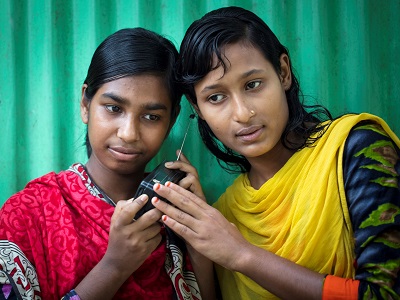Cover image: © UNICEF/UNI333814/Mawa - Adolescents were listening the radio in program on 'adolescent health' on aired by the Bangladesh betar at Dewanganj, Jamalpur.
This course aims to build learners capacity to implement and promote approaches to strengthen Accountability to Affected Populations. It introduces learners to UNICEF commitment to AAP as an organizational priority and illustrates how to apply AAP key principles across the programme cycle, outlining some practical approaches and presenting good practices from development and humanitarian programmes.
This course is available in Arabic, English, French and Spanish.
Overview
This course introduces learners to UNICEF commitment to AAP as an organizational priority and illustrates how to apply AAP key principles across the programme cycle, outlining some practical approaches and presenting good practices from development and humanitarian programmes.Audience
- UNICEF staff (country offices, regional offices and HQ), including consultants, interns and volunteers
- UNICEF
partners, including government, civil society and private sector
Learning objective
This course aims to build learners capacity to
implement and promote approaches to strengthen Accountability to Affected
Populations.
Length
It should take you about 5 hours to complete this
self-paced course, but if you wish to look into the optional further reading
and other resources provided, it will take longer.
Structure
The course is composed of 6 modules:
Module 1: Introduction to Accountability to
Affected Populations
Module 2: Integrating AAP in the way we work
Module 3: Strengthening AAP in the programme
cycle
Module 4: AAP in action
Module 5: Partnership and collaboration
Module 6: Key reflections on AAP
Methodology
This course contains six self-paced modules that introduce the key content and messages on Accountability to Affected Populations. Each module contains interactive elements such as case studies, diagrams, videos and a short quiz. The final module allows the learner to test their newly acquired knowledge through a role play exercise.
Contact details
Content issues and questions:
Justus Olielo, Emergency Specialist,
Accountability to Affected Populations, EMOPS
Charles Antoine Hofmann, Senior Adviser,
Accountability to Affected Populations, EMOPS
